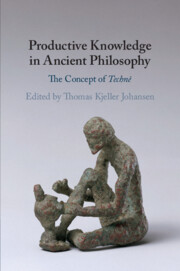Book contents
- Productive Knowledge in Ancient Philosophy
- Productive Knowledge in Ancient Philosophy
- Copyright page
- Contents
- Contributors
- Acknowledgements
- List of Abbreviations
- Introduction
- Chapter 1 Protagoras on Political Technê
- Chapter 2 Dynamic Modalities and Teleological Agency
- Chapter 3 Technê As a Model for Virtue in Plato
- Chapter 4 Crafting the Cosmos
- Chapter 5 Aristotle on Productive Understanding and Completeness
- Chapter 6 Technê and Empeiria
- Chapter 7 The Stoics on Technê and the Technai
- Chapter 8 The Epicureans on Technê and the Technai
- Chapter 9 The Sceptic’s Art
- Chapter 10 Plotinus on the Arts
- Chapter 11 Productive Knowledge in Proclus
- Bibliography
- General Index
- Index Locorum
Chapter 2 - Dynamic Modalities and Teleological Agency
Plato and Aristotle on Skill and Ability
Published online by Cambridge University Press: 14 January 2021
- Productive Knowledge in Ancient Philosophy
- Productive Knowledge in Ancient Philosophy
- Copyright page
- Contents
- Contributors
- Acknowledgements
- List of Abbreviations
- Introduction
- Chapter 1 Protagoras on Political Technê
- Chapter 2 Dynamic Modalities and Teleological Agency
- Chapter 3 Technê As a Model for Virtue in Plato
- Chapter 4 Crafting the Cosmos
- Chapter 5 Aristotle on Productive Understanding and Completeness
- Chapter 6 Technê and Empeiria
- Chapter 7 The Stoics on Technê and the Technai
- Chapter 8 The Epicureans on Technê and the Technai
- Chapter 9 The Sceptic’s Art
- Chapter 10 Plotinus on the Arts
- Chapter 11 Productive Knowledge in Proclus
- Bibliography
- General Index
- Index Locorum
Summary
In the course of discussing the nature of justice in the first book of the Republic, a number of claims are made concerning the nature of technê and what it is to be skilful or to have an ability. Nawar shows how three of these claims, which do significant conceptual work in both Plato and Aristotle, can be explained and defended. The first claim, by Socrates, concerns the ‘two-way’ nature of certain skills. For instance, the person who is skilful at hitting is not only proficient at hitting well, but also proficient at avoiding being hit. The second claim, by Thrasymachus, is that the practitioner of a technê is, in a certain way, infallible and cannot fail to bring about what they intend. The third claim, made by Socrates, is that technai are not value-neutral, but rather are directed at the good of their object. Namar examines these claims, clarifies them, and attempts to explain them (so far as possible). Furthermore, he shows that these claims play an important role in Aristotle’s thought and examines how Aristotle aims to incorporate or adapt these claims in his own discussion of the modal and teleological aspects of skills and rational capacities.
- Type
- Chapter
- Information
- Productive Knowledge in Ancient PhilosophyThe Concept of <I>Technê</I>, pp. 39 - 61Publisher: Cambridge University PressPrint publication year: 2021
- 2
- Cited by

